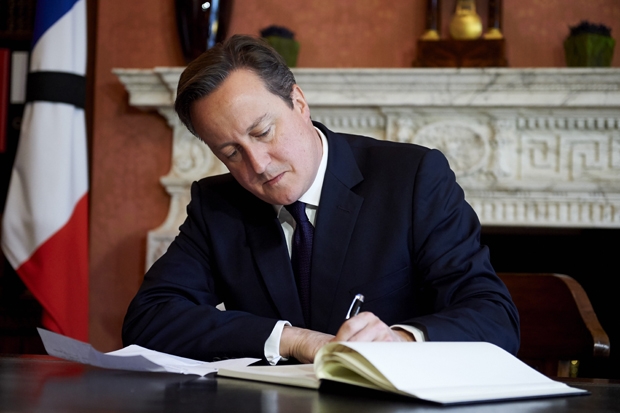To say that the Paris attacks could have happened in Britain is not enough. Such attacks are being attempted here with terrifying regularity —seven have been thwarted so far this year alone. MI5’s official assessment is that a terrorist attack on British soil is ‘highly likely’. Our security services have so far been very good at keeping us safe. But as the IRA famously put it, spies have to be lucky all of the time, terrorists have to be lucky only once.
So it is impossible for Britain to view events on the continent with any sense of complacency. Still, the Prime Minister was justified in pointing out last week that the more we learn about what happened in Paris, the more it justifies the policies that Britain has pursued. He could have gone further and said that the tragic direction of continental Europe over the last few years has vindicated several more decisions taken by Britain.
Sofia Helin, lead actress in the television series The Bridge, this week contrasted the generous immigration policy of her native Sweden with what she sees as Britain’s flinty-hearted approach. Sweden is taking almost 200,000 this year alone; adjusting for population, that’s like Britain finding space for a refugee city the size of Birmingham. The results? In Malmö, locals now escort Jews home from synagogue to protect them from attack by Muslim immigrants. The backlash is so strong that refugee centres are being set ablaze on a regular basis. The Sweden Democrats, a party routinely described as ‘neo-fascist’ by the press, tops the polls.
Yes, Britain has many problems, but not on this scale. Germany may be next, after Angela Merkel’s disastrous response to the pictures of a dead Syrian boy on a Turkish beach. Her declaration that Germany would welcome all Syrians served only to encourage more desperate people to make the potentially lethal journey across the Mediterranean. The resulting flow of human traffic involves precious few women or children, and many single men — including, it now seems, one of the terrorists who attacked Paris.
David Cameron’s decision to take only Syrian refugees from local camps, rather than those with the money to pay the people smugglers, now looks wise. It was wrong of the government to take just a few hundred asylum-seekers at first, but 20,000 by 2020 is a reasonable compromise. Taking all those who will come, the favoured policy of Swedish actresses and German chancellors, is not compassionate. It leads to more deaths, undermines public support for immigration, poisons community relations and risks turning a humanitarian crisis into a political crisis.
Nor is it compassionate to welcome Muslim immigrants and then shovel them to edge-of-city housing estates without job prospects or the hope of integrating in society. Britain takes more than 1,600 immigrants a day — but as workers, not charity cases. For a country to tolerate this level of immigration with no far-right backlash is nothing short of extraordinary. Immigration remains the issue that most troubles the public, but this mainly relates to practical matters such as housing, school places, GP pressures. While the Front National surges in France, the British National Party lies all but dead — its vote falling by 99 per cent at the last election. In Ukip, Britain has a proudly anti-racist populist party that refuses to do deals with Madame Le Pen.
The British jobs miracle arrived at just the right time. While Europe grapples with mass joblessness — a Petri dish for all kinds of social evils — Britain is witnessing the highest level of employment we have ever known. True, a good proportion of the new workers are Portuguese, Germans, Italians and Poles, who are making a mockery of David Cameron’s immigration target. But this is a problem of success.
George Osborne has taken too long to control public spending and cut taxes. But he looks like an economic genius compared with almost any of his continental counterparts. And his domestic rivals? John McDonnell, the shadow chancellor, is planning to attend an anti-austerity march in London this weekend with Yanis Varoufakis, the former finance minister of Greece. As they rail against the policies of the last five years, they both might want to ask themselves whether Britain’s ability to escape the European orbit of economic decline is really a coincidence — or related to decisions taken in Downing Street.
Borders are now being reasserted all over Europe: between France, Belgium and the Netherlands, Germany and Austria and — as of last week — ‘The Bridge’ between Denmark and Sweden. Tony Blair made a great many mistakes, but at least he was persuaded to stay out of the Schengen agreement and the euro, retaining Britain’s border controls and the pound. Both have been invaluable.
Cameron could have done much more to speed up our recovery, promote social cohesion and protect the military he is now itching to deploy. But he has avoided a few of the disastrous mistakes his panicked European counterparts have made. Good government means taking the right decisions — but also avoiding the wrong decisions. And for that the Prime Minister deserves credit.
Join The Spectator’s Andrew Neil, Fraser Nelson and James Forsyth on 26 November to discuss George Osborne’s Autumn Statement and any surprises the Chancellor might have in store. Click here for more information and to book tickets.







Comments